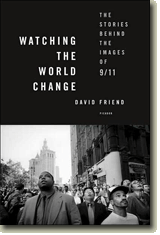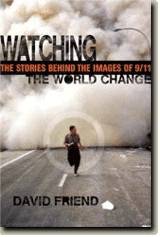« Previous · Home · Next »
January 15, 2007
BUSH'S MINI-MEA
Twice this week we were granted a rare spectacle: the sight of a vulnerable George W. Bush.
On Thursday the president attended a White House memorial for a Medal of Honor recipient. Corporal Jason Dunham, 22, in a successful attempt to save three fellow Marines in Iraq in 2004, lost his life after leaping to smother a live grenade, dying at Bethesda Naval Hospital, a week after the incident. During the ceremony for Corporal Dunham, the president was so moved that he shed a tear, which was clearly evident in news photographs.
Not that we've never seen Mr. Bush with a tear-streaked cheek. Indeed, the president, like his father before him, is prone to visible signs of emotion at certain times. As his former spokesman Ari Fleischer told me in an interview for Watching the World Change: the week of September 11, in a conference call with New York's George Pataki and Rudy Giuliani, the president "started to cry at the end of the call. In that classic way that Bush men do, he started to tear up. And there are some wonderful photographs that captured that tear. The press was in the Oval Office for it."
And yet I couldn't help feeling, upon seeing the picture from this week's memorial, that this was a sorry, single tear a year or two or three too late. According to press reports, the president has never deigned to attend any of the 3,000-plus funerals held for U.S. servicemen and women killed in Iraq. Had he done so, perhaps we would have seen this image much earlier -- and perhaps he might have altered his war plans long, long ago.
Then, on Sunday, the president again revealed his vulnerable side, this time on 60 Minutes, in an interview with correspondent Scott Pelley. The very fact that Bush's handlers had agreed to this forum--a no-holds-barred one-on-one on the never-forgiving newsmagazine show--was a sign that the White House communications team had finally acknowledged the dire state of the president's approval numbers (a scant 17 percent, according to Pelley). Part of the exchange went like this:
BUSH: Abu Ghraib was a mistake. Using bad language like, "Bring 'Em On," was a mistake. I think history is gonna look back and see alot of ways we could have done things better. No question about it.
PELLEY: The troop levels...
BUSH: Could have been a mistake.
PELLEY: Could have been a mistake?
BUSH: Yeah. [General] John Abizaid, one of the planners, said in front of Congress, you know, he thought we might have needed more troops.... Well, if people want a scapegoat, they got one right here in me 'cause it's my decisions [sic].
The president had finally found it necessary to appear contrite--as he had been after the devastating Republican loss of both houses of Congress in the November midterms (which had forced him to admit that his party had taken a "thumpin'"). Maybe, just maybe his advisers had determined that it was easier to offer a mini-mea culpa and then stick to his guns (sending 20,000 more troops into Iraq's wide maw) than to face the prospect of admitting that his father's team, the Iraq Study Group, was correct in calling for a phased withdrawal, diplomatic overtures, and incentives along with benchmarks for the Iraqi government.


